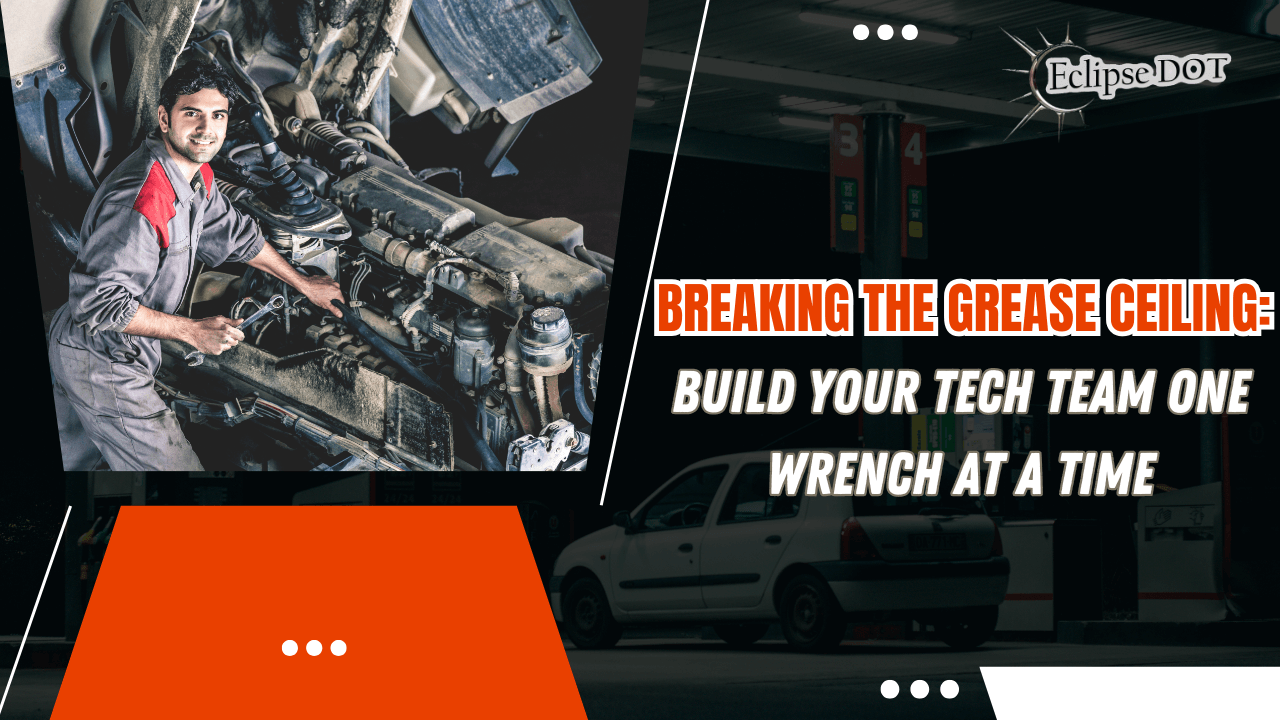Let’s be honest—there’s only so long you can duct tape a maintenance operation before things fall apart. Trucks are piling up, drivers are frustrated, and your lead tech is two coffee breaks away from quitting or snapping a torque wrench in half.
If you’ve been hoping for a diesel tech miracle, it’s time for a reality check: no one is coming to save you.
But here’s the part that should get your motor running: you don’t need saving. The answer isn’t out there floating in resume land. It’s right inside your shop. In your hands. In your decision to stop waiting and start building your technician team from the ground up.
You do that one wrench, one training hour, and one sharp, grease-stained up-and-comer at a time.
The Technician Shortage That’s Breaking More Than Just Trucks
You’re not imagining things. The diesel tech shortage is real—and it’s grinding entire operations to a halt.
In fact, the U.S. Bureau of Labor Statistics projects more than 28,000 diesel technician openings every year through 2031. That’s not a drip—it’s a flood.
Meanwhile, the TechForce Foundation reports we’ll need 177,000 new diesel techs by 2026 to meet the industry’s demand. This isn’t just a gap. It’s a canyon. One that’s swallowing up fleet productivity, safety, and sanity.
Why? Because experienced techs are aging out, and not enough young people are stepping in to replace them. And when they do, they often leave early—frustrated by slow progress, limited mentorship, or outdated training methods.
Clearly, something has to change.
Be Pro Be Proud: The Program Putting the Trades Back on the Map
Thankfully, change is rolling in—on 18 wheels, no less.
The Be Pro Be Proud program isn’t just turning heads, it’s turning the entire trades industry around. Instead of sending worn-out brochures and tired recruiters into high schools, it’s hauling in a high-tech trailer filled with VR gear, hands-on simulators, and energy you can’t ignore.
Since its launch, this initiative has made more than 3,000 stops across 1,500 towns, engaging over 430,000 people—including 100,000 students—in states like Texas and New Mexico. And the results? They’re massive.
This program is doing something we haven’t seen in decades: making trade careers cool again. It’s planting the seed early—showing young people that becoming a diesel tech isn’t a fallback plan, it’s a future.
FMCSA Just Took Off the Training Handcuffs
Now let’s talk about the shift that has shops everywhere sitting up straight.
Until recently, bringing in a new technician meant playing the long game. A good hire would still need a full year of experience before they could legally inspect vehicles or perform brake-related work. That’s twelve months of holding a flashlight and hoping they don’t walk.
But now, thanks to a bold move from the FMCSA, things have changed.
As of January 2025, the agency has granted a five-year exemption allowing technicians to become qualified after 540 hours of training—provided it’s based on TMC’s Recommended Practices. That’s just 13½ weeks from greenhorn to certified.
This isn’t some watered-down shortcut either. FMCSA reviewed the standards and gave it their stamp of approval, stating the RP-based path is equally—if not more—safe than the traditional year-long method.
That means fleets can move faster, smarter, and with confidence—while still putting safe, capable technicians into critical roles.
What It Means for Your Shop (Spoiler: Everything)
Here’s what this exemption really means: control is back in your hands.
You can now train techs in-house, at your pace, using real-world tools. You can ditch the endless hiring cycle and start building your own team—on your terms. And for the first time in a long time, you’re not at the mercy of overbooked shops, poached employees, or impossible hiring standards.
You have an opportunity to transform your tech shortage from a pain point into a competitive edge.
If you’re willing to invest in your people, the path to a fully staffed, high-performing shop just got a whole lot shorter.
Use What’s Already Built: TMC’s RPs
Now, if you’re thinking this all sounds great but you have zero time to build a training curriculum from scratch—relax. The work’s already been done for you.
TMC’s Recommended Practices (RPs) are industry-approved, field-tested blueprints designed to walk you through technician development step-by-step. Whether you need to build a full apprenticeship program or just evaluate someone’s electrical skills, there’s an RP for that.
For example, RP 546 shows you how to create a successful apprenticeship program from the ground up. RP 548 tackles ADAS training (because trucks are basically spaceships now). And RP 1204A helps you evaluate electrical skills before someone melts your wiring harness.
To make it even easier, TMC created a training app with modules on brakes, chassis, and electrical. More modules—covering tires, wheels, and preventive maintenance—are coming in 2025. Soon, you’ll have a full-service technician academy in your back pocket.
Everything you need to train and certify your team is already in place. You just need to put it to work.
The Industry’s All In
Still think this sounds too good to be true?
The American Transportation Research Institute (ATRI) is backing this movement with extensive research. They’re gathering data from fleets, training schools, and working techs to help strengthen recruiting, improve retention, and eliminate roadblocks.
Meanwhile, Work Truck Online has called technician shortages the number one trend for 2024—urging fleets to stop waiting and start building.
This isn’t a trend anymore. It’s a transformation. And the ones who adapt now? They’re going to win later.
Stop Hoping. Start Building.
At Eclipse DOT, we’ve seen the tired eyes of shop managers who’ve tried everything. We’ve seen trucks lined up behind garages that don’t have enough manpower to get through half the work orders. And we’ve heard the frustration in fleet managers who are drowning in compliance headaches while their best people burn out.
But we’ve also seen what happens when companies decide to build.
We’ve watched small shops turn into training hubs. We’ve helped city fleets develop in-house certification systems. And we’ve coached leaders who were ready to stop reacting—and start leading.
Because here’s the truth: you don’t need to find a hundred great techs. You just need to train one.
Start with one tech who’s hungry to learn. Give them a path. Invest in their growth. Use the exemption, tap into TMC’s resources, and pour into them like your fleet depends on it—because it does.
From there, you build.
One wrench.
One tech.
One future-ready fleet at a time.
Gain exclusive access to our CDL & DOT Compliance articles with a trial at DOTDocs.com. And don’t forget to claim your FREE micro audit at THE ECLIPSE DOT MICRO AUDIT. Ready for seamless operations? Discover the difference today!
📚 Sources:
ATA/TMC Hail FMCSA Exemption – trucking.org
Fleet Concerns 2024 – Transport Topics
Be Pro Be Proud Initiative
ATRI Research on Diesel Technician Shortage
2024 Labor Shortages – Work Truck Online


